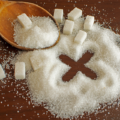Table sugar

Humanity is plagued by many food intolerances: lactose, fructose, histamine intolerance or coeliac (gluten intolerance).
Sucrose intolerance – table sugar intolerance
Rarer forms of food intolerance include sucrose intolerance or table sugar intolerance, whereby sufferers cannot tolerate table sugar (sucrose) or malt sugar (maltose).
For these individuals, consuming sucrose can lead to stomach pain, cramps, diarrhoea, failure to thrive and grow in children, and can sometimes also upper as respiratory conditions, and kidney stones.
Sugar consumption is shockingly high as the food industry uses sugar to enhance flavours and so we consume sugar without realising it. Sugar is a popular flavour enhancer used by the food industry as an additive in many foods. A major part of our sugar requirement is therefore “unconsciously” met by many consumers. The World Health Organization (WHO) recommends a daily table sugar intake of around 25 grams. However, we consume four times as much sugar than is recommended, which is alarming for affected individuals.
But what exactly is sucrose intolerance? Dr med. Jens Müller-Ziehm,a specialist in internal medicine/gastroenterology explains: “The primary form of sucrose intolerance – the main form of sucrose-isomaltase malabsorption – is a genetic enzyme defect. It is a rare, hereditary autosomal recessive metabolic disorder that can be seen in childhood at around sixth months old, when sugar is first introduced into the diet.” Therefore, if your child displays signs of abnormalities here you should consult a doctor.
The specialist continues: “The secondary form of sucrose-isomaltase malabsorption is often the result of acute bowel inflammation or other conditions of the small intestine such as coeliac disease. Both forms of sucrose intolerance involve an enzyme deficiency in the small intestine, whereby the breakdown of sucrose (table sugar) and maltose (malt sugar) does not happen, or does not function correctly. (…) Therefore, sugar is not metabolised and remains in the large intestine and is converted into carbon dioxide and water, which can lead to diarrhoea, stomach cramps, vomiting and discomfort.”
A diagnosis of sucrose intolerance can currently only be confirmed by a taking a biopsy from the small intestine. Table sugar can also present more serious consequences, however.
Can table sugar cause cancer?
High sugar consumption is often listed as a cause of cancer but this remains to be proven. A discovery was made over a century ago showing that tumour cells – stronger than healthy cells – pounce on sugar.
At the beginning of the 20th century, Canadian anthropologist Vilhjámur Stefánsson observed that the Inuit did not suffer from cancer provided they followed a traditional diet. But during the mid-20th century, when they converted to industrialised food rich in carbohydrates due to convenience, they began dying of cancer.
The previous studies show that although sugar wasn’t the cause of the cancer, it feeds the cancer cells once the cancer has broken out.
Typical western diets are the problem
In their online edition of specialist magazine Cancer Research, researchers at the University of Texas M. D. Anderson Cancer Center warn of the high sugar content in a typical western diet. Sugar – as shown by a recent study – has a tumour-promoting effect, activates the formation of breast cancer cells and accelerates tumour growth as well as metastasis formation.
Co-author of the Texan study, Dr Lorenzo Cohen, explains: “We determined that fructose derived from the sucrose and HFCS (high-fructose corn syrup) – both of which are prevalent in modern diets – was responsible for facilitating lung metastasis and 12-HETE production in breast tumours.” The scientists warn that even moderate sugar consumption can be critical.
According to Statista, in 2018 breast cancer was the most common form of cancer in Europe. With almost 405,000 new diagnoses, the most dangerous form of cancer for women was responsible for 13.5 percent of all new cancer cases. According to Pharma Fakten, around 1.4 million people died of cancer in 2019.
Tumour biologist Johannes Coy gets to the heart of the issue on ntv: “In highly developed civilisations, people have changed their eating habits and now consume more carbohydrates and also feed their pets a similar diet. It’s a double-edged sword, according to Coy. After all, carbohydrates, which the body quickly converts into sugar, feeds the brain. This is the only way of achieving top mental performance as sugar prevents neurons from dying off. “However, sugar also protects cancer cells, which is why they often survive radiation and chemotherapy,” says Coy.
Carbohydrates can become a problem
It’s a dilemma. Humans need sugar to live, as without sugar intake we would probably be unable to survive. However, sugar can lead to serious health issues. The problem does not just lie in table sugar, however, but also other foods containing carbohydrates. Carbohydrates represent the most essential nutrient for the body, but unfortunately the body converts it into sugar.
Are cancer cells actually dependent on sugar? The good news is that scientists at the University Hospital Würzburg are tirelessly researching the sugar metabolism of tumours.
In order to remove the fuel for the cancer cells, some doctors suggest that patients remove sugary food and drink from their diet and to restrict the consumption of foods rich in carbohydrates.
The German Cancer Society (DKG), however, does not recommend a low-carbohydrate diet in its scientific opinion. “Based on the data provided, a low-carbohydrate or ketogenic diet cannot be recommended for this condition.”
The DKG recommends ten rules from the German Nutrition Society (DGE) to prevent cancer: “The results of the 2008 Nutrition Report support the recommendations for a balanced diet to prevent cancer based on the DGE’s 10 rules: plenty of fruit and vegetables (400 g of vegetables and 250 g of fruit per day for adults), lots of high-fibre cereal products and moderate consumption of meat and meat products (around 300 to 600 g/week). Red meat consumption in particular should be minimised and alcohol avoided.”
This articles deals with a health topic. It should not be used for self-diagnosis, and is no substitute for diagnosis by a doctor.




